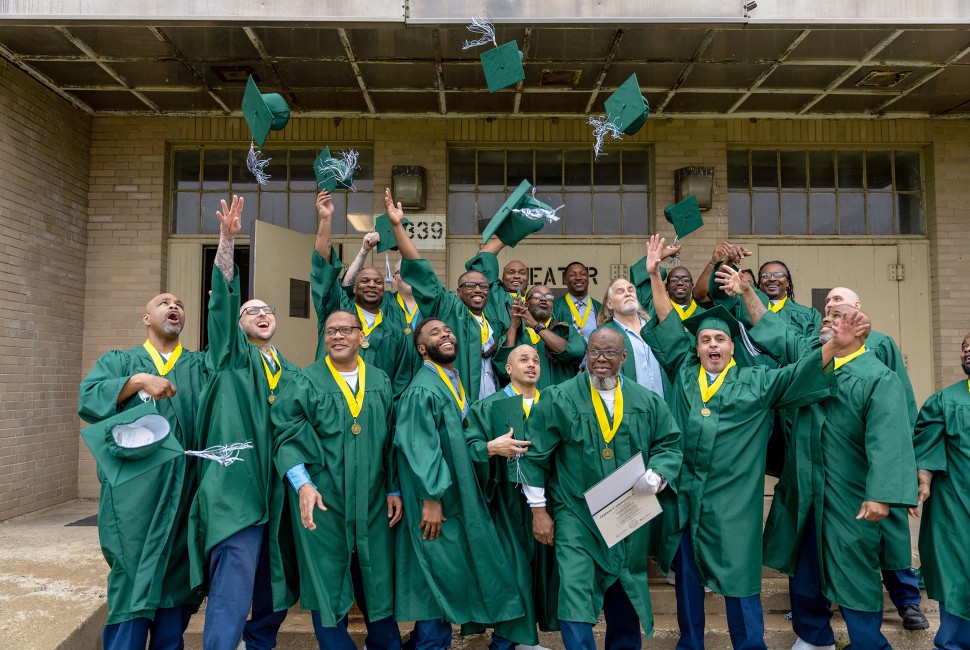A thriving, diverse and triumphant community of Northwestern Prison Education Program (NPEP) supporters gathered recently to celebrate the launch of a new bachelor’s degree program for incarcerated people — a milestone for prison education provided by elite institutions as the first such program offered by a top 10 university.
Northwestern admitted the inaugural class in January, after students completed course work required to attain an associate degree from Northwestern’s partner, Oakton Community College. The students are expected to graduate from Northwestern in 2023.
A collection of Northwestern administrators, faculty and students, justice advocates, formerly incarcerated people, their families and the families of those students who remain incarcerated recently gathered for a reception and a panel discussion by NPEP director Jennifer Lackey, who is the Wayne and Elizabeth Jones Professor of Philosophy; Provost Kathleen Hagerty; law professor Sheila Bedi; graduate student Madison Hursey; and three formerly incarcerated NPEP students.
“We will see more of the nation’s elite universities award bachelor’s degrees to incarcerated people in the future because it is the right thing to do, and I’m so proud that we are one of the first,” said Hagerty, welcoming approximately 100 people in the Allen Center on May 19.
Evoking the message of “Just Mercy” by One Book One Northwestern author Bryan Stevenson, Hagerty spoke about the need to get proximate to suffering and injustice to understand it.
“That’s exactly what is happening here,” she said. “It brings me great pride to think of what it means to these 20 men and their families and the communities they will return to educated and prepared to join organizations that need their perspectives on society’s challenges and opportunities.”

Corzell Cole, a formerly incarcerated Stateville student, one of the 20 men admitted to the bachelor’s program, said he owes his freedom to his first NPEP class, which paired Stateville students with students in Bedi’s law class.
“That class is the reason I am out of prison because I met a law student named Shelisa Thomas, who ultimately became my attorney three years later. Fourteen months after that, I was released from prison.
“They actually let me back into the prison to graduate with my guys. There are certain things that just don’t happen in life,” Cole said. “I am a living testament to things that just don’t happen. People don’t walk out of the penitentiary 28 years early. People aren’t given a second chance or opportunities to gain higher education. I am the guy who got that second chance.”
What does NPEP means to its community?
Northwestern Now has gathered a series of quotes by several of the individuals deeply involved in the prison education program.
“We have seen education elighten”
- Jennifer Lackey, Director, NPEP
“We have seen education enlighten, we have seen education empower, we have seen education transform. Our students have become poets and painters, policy writers and legal advocates, published authors and lovers of math and physics, visionaries and leaders, mentors and dreamers. And we have seen the bright light shine in some of the darkest and most unforgiving corners of our nation.”
Calling her vision “bold and courageous,” Lackey said, “Provost Hagerty saw Northwestern emerging as a national leader in rethinking what justice demands of a university, and she has worked tirelessly and compassionately to make it a reality.”
“We are deeply committed to the program’s success”
Thomas Gibbons, dean of the School of Professional Studies, which will confer bachelor’s degrees to the students
"Northwestern is the first top 10 university in the nation to offer a degree-granting prison education program. We are committed to providing a high-quality educational experience, combined with the necessary tutoring and support services for this unique population of learners. Our faculty, NU law and graduate students who are teaching in NPEP and our staff are deeply committed to the program's success."



